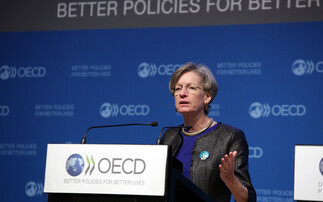
This paper showcases the important role of data in our efforts to drive sustainable change in infrastructure and identify the companies that we expect to capitalise on the energy transition.
Global CO2 pricing is on its way: a decade ago 8% of the planets emissions were priced (source: The Economist, October 2023). Today this is closer to 25%. For sectors with material CO2 emissions, material CO2 pricing is coming.
In the US utilities sector (responsible for 25% of US GHG emissions) CO2 pricing will create winners and losers. To identify the winning and losing companies for our investors, we have developed a proprietary forward looking framework, built upon our 2022 Carbon Shock Analysis.
This framework is an example of the important role of data in our efforts to drive sustainable change in infrastructure and identify the companies that we expect to capitalise on the energy transition and be more profitable in the future.
Carbon pathway framework in practice: winners vs losers
Our investment strategy combines data and ESG factors for alpha (generating returns). Here, we will outline how we use our framework to distinguish the "winners" from the "losers" in the energy transition. We focus on the largest CO2 emitting sector, utilities, and on the direct impact on each company's valuation.
The winners will be those companies which decarbonise the fastest and hence minimize the impact of carbon emissions pricing schemes. The losers will be those that decarbonise the slowest and hence will be most exposed to these costs. To distinguish between the latter and the former, we forecast carbon emissions and carbon costs, and use the results to attribute an ESG score to these companies, which is used in our valuation process alongside our discounted cash flow models.
How does this work? Using the US Energy Information Administration (EIA) overview of all US power generation facilities (via S&P Capital IQ) we compiled a schedule of announced coal and gas plant decommissions, coal to gas conversions, and gas plants being built in the US over the coming three decades. This data set covers 479 facilities across the US.
We updated the collected dataset with any new announcements by the companies to obtain the most recent records available. We also estimate the future GHG (greenhouse gas) emissions of planned power plants by applying tCO2/MW factors (by fuel type) on existing power plants. Next, using the closure/conversion/opening schedules, we forecast the change in GHG emissions from each facility, and aggregate this to company level.
A conservative approach to decarbonisation
With so much carbon data available it is essential to apply strict goal setting and plan execution criteria. Without doing this, we would be susceptible to greenwashing by giving companies more credit than they are due. We take a more conservative approach when there is ambiguity on plant closures, which provides us with a more reliable estimate of decarbonisation pathways.
Conservative view
- what we do not give credit for:
· When a company sets targets to decarbonise (e.g. "20% reduction by 2030") but does not provide information on how this will be achieved (date and facility), we assume NO reduction in carbon emissions. We believe that committing to a more specific decarbonisation pathway increases the transparency of the announcement in terms of which plants will close and by when, enhancing the credibility of the decarbonisation goal.
· When a company announces that a power plant will move from baseload to backup capacity, implying a material drop in utilisation rate (e.g. reducing the utilisation of a coal power plant from 65% to 20%), we give NO credit for decarbonisation from this, as this plant could ramp up as easily as it ramps down in future - we witnessed this in 2022, when the geopolitical situation restricted the gas supply and countries opted for increasing coal and gas electric production from plants that saw its production recover.
Consequences
- how this affects valuation:
· On the positive side: the more credible and material a company's decarbonisation plans are, the better rewarded this is in our investment process. All else equal, this will increase valuation upside and hence more capital will be allocated.
· On the negative side: when the decarbonisation pathways do not fulfill our conservative criteria, the company is penalised in our investment process. This reduces the valuation upside and the likelihood of investment. This shortfall in commitment becomes a trigger for engagement, where we actively raise the issue with management, setting out our expectations of them. We endeavour to frame all of our engagements as a win-win for investors, the company and society - we do this by asking for a change that is in shareholders' interest as well as society's interest.
Do you want to know more?
Go to our website to read the full whitepaper. Or to sign up for our webinar "The energy transition is happening - are you making the most of it?" on 28 February 9:00 GMT.
This post is funded by Van Lanschot Kempen













